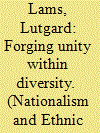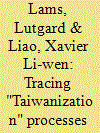| Srl | Item |
| 1 |
ID:
178076


|
|
|
|
|
| Summary/Abstract |
This article presents a theoretical framework on discursive nation-building processes in the Chinese and Taiwanese contexts by drawing on key notions in the discourse-theoretical account about identity construction, hegemonic articulation and myth-building, as proposed by prominent scholars of Discourse Theory, like Ernesto Laclau and Chantal Mouffe (1985). The framework is based on existing literature as well as findings from two case studies about discourses belonging to two different epochs in Chinese history: (1) Chinese and Taiwanese media narratives about the 1997 Hong Kong handover, published between mid-June and mid-July 1997 and (2) Lectures on Nationalism, presented in 1924 by dr. Sun Yat-sen, an early proponent of Chinese nationalism.
|
|
|
|
|
|
|
|
|
|
|
|
|
|
|
|
| 2 |
ID:
191760


|
|
|
|
|
| Summary/Abstract |
This article analyses perceptions of NATO in Chinese and Russian press narratives. China and Russia are often mentioned together as they share a common (geo)political position towards a perceived hegemonic West. We analysed frames constructing NATO, a key Western military alliance, at the time of the Warsaw summit in 2016 as well as the origins of the frames, stemming from the sources quoted. Both countries frame NATO foremost as an aggressive organisation stuck in Cold War confrontational worldviews while Russia and China are open to dialogue and cooperation. The main narrative that emerges, therefore, centres on the self-proclaimed moral superiority of Russia and China.
|
|
|
|
|
|
|
|
|
|
|
|
|
|
|
|
| 3 |
ID:
104356


|
|
|
|
|
| Publication |
2011.
|
| Summary/Abstract |
Over the last few decades, Taiwanese society has witnessed processes of localization/ Taiwanization/ de- and re-Sinicization (Sinification), all vying for legitimacy. These trends in the nation-building process are played out on the state as well as the civil society level. It can thus be useful to examine whether societal (de-)localization trends are paralleled in any ideological repositioning of official and/or media discourses after a change in ruling party. The current article investigates an important discursive site in Taiwan's public space, the presidential discourse of the new Kuomintang (KMT) (Guomindang) era, starting from the inauguration address by President Ma Ying-jeou (Ma Yingjiu) on 20 May 2008.
|
|
|
|
|
|
|
|
|
|
|
|
|
|
|
|